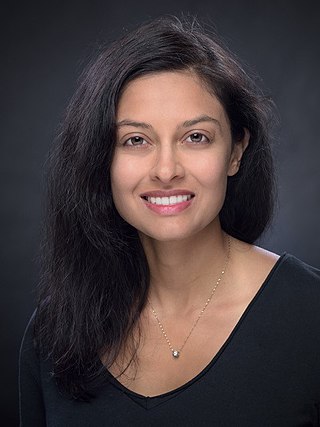
Dame Angela Ruth McLean is professor of mathematical biology in the Department of Biology, University of Oxford, and Chief Scientific Adviser to the UK Government.
The Department of Social Policy and Intervention is an interdisciplinary centre for research and teaching in social policy and the systematic evaluation of social intervention based in the Social Sciences Division of the University of Oxford. It dates back to Barnett House, a social reform initiative founded in 1914 by a reform movement clergyman, Samuel Barnett, becoming a department of Oxford in 1961.
Francisca Mutapi is a Professor in Global Health Infection and Immunity, co-Director of the Global Health Academy at the University of Edinburgh, and Deputy Director of the National Institute for Health Research (NIHR) Global Health Research Unit Tackling Infections to Benefit Africa. She is the first black woman known to have been awarded a professorship by the University of Edinburgh.

Irene Mary Carmel Tracey is Vice-Chancellor of the University of Oxford and former Warden of Merton College, Oxford. She is also Professor of Anaesthetic Neuroscience in the Nuffield Department of Clinical Neurosciences and formerly Pro-Vice-Chancellor at the University of Oxford. She is a co-founder of the Oxford Centre for Functional Magnetic Resonance Imaging of the Brain (FMRIB), now the Wellcome Centre for Integrative Neuroimaging. Her team’s research is focused on the neuroscience of pain, specifically pain perception and analgesia as well as how anaesthetics produce altered states of consciousness. Her team uses multidisciplinary approaches including neuroimaging.

Devi Lalita Sridhar FRSE is an American public health researcher, who is both professor and chair of global public health at the University of Edinburgh, Scotland. Her research considers the effectiveness of public health interventions and how to improve developmental assistance for health. Sridhar directs the University of Edinburgh's Global Health Governance Programme which she established in 2014.
Rachel Tanner is an immunologist working at the University of Oxford. She won the UK 'Women of the Future' Award for Science in 2019.

Dame Sarah Catherine Gilbert FRS is an English vaccinologist who is a Professor of Vaccinology at the University of Oxford and co-founder of Vaccitech. She specialises in the development of vaccines against influenza and emerging viral pathogens. She led the development and testing of the universal flu vaccine, which underwent clinical trials in 2011.
Trudie Lang is a Professor of Global Health Research at the University of Oxford. She specialises in clinical trials research capacity building in low-resource setting, and helped to organise the trial for the drug brincidofovir during the 2014 Ebola virus outbreak.
Sir Peter William Horby is a British physician, epidemiologist, Moh Family Foundation Professor of Emerging Infections and Global Health, and Director of the Pandemic Sciences Institute at the University of Oxford. He is the founder, and former director of the Oxford University Clinical Research Unit in Hanoi, Vietnam which was founded in 2006. In 2014, Horby established the Epidemic Research Group Oxford (ERGO). ERGO incorporates a number of international projects such as the European Commission funded PREPARE, the African coaLition for Epidemic Research, Response and Training (ALERRT), and the International Severe Acute Respiratory and emerging Infection Consortium (ISARIC). Since 2016, Horby has been chair and executive director of ISARIC.
Jennifer J. Kurinczuk is a British physician who is a Professor of Perinatal Epidemiology and Director of the National Perinatal Epidemiology Unit at the University of Oxford. In 2019 she was named an Honorary Fellow of the Royal College of Obstetricians and Gynaecologists. During the COVID-19 pandemic, Kurinczuk investigated the neonatal complications of coronavirus disease.
Carl James Heneghan is a British general practitioner physician, a clinical epidemiologist and a Fellow of Kellogg College. He is the director of the University of Oxford's Centre for Evidence-Based Medicine and former Editor-in-Chief of BMJ Evidence-Based Medicine.
Marian Knight is a British physician who is a Professor of Maternal and Child Population Health at the University of Oxford. She is an Honorary Consultant of Public Health for Public Health England. During the COVID-19 pandemic Knight studied the characteristics and outcomes of pregnant women who tested positive for COVID-19.
Katie Jane Ewer is a British immunologist and Professor of Vaccine Immunology at the University of Oxford's Jenner Institute.
Sir Andrew John Pollard is the Ashall Professor of Infection & Immunity at the University of Oxford and a Fellow of St Cross College, Oxford. He is an Honorary Consultant Paediatrician at John Radcliffe Hospital and the Director of the Oxford Vaccine Group. He is the Chief Investigator on the University of Oxford COVID-19 Vaccine trials and has led research on vaccines for many life-threatening infectious diseases including typhoid fever, Neisseria meningitidis, Haemophilus influenzae type b, streptococcus pneumoniae, pertussis, influenza, rabies, and Ebola.
Sir Martin Jonathan Landray is a British physician, epidemiologist and data scientist who serves as a Professor of Medicine & Epidemiology at the University of Oxford. Landray designs, conducts and analyses large-scale randomised control trials; including practice-changing international trials that have recruited over 100,000 individuals. Landray previously led the health informatics team that enabled the collection and management of data for the UK Biobank on over half a million people.
Allison Elizabeth Aiello is an American epidemiologist. She is a professor of Epidemiology and a Carolina Population Center Fellow at the University of North Carolina at Chapel Hill. Aiello is an expert in influenza, investigating non-pharmaceutical interventions for flu prevention.
The Centre for Genomic Pathogen Surveillance is a computational genomics research institute in Oxfordshire.
Christine Rollier is a French immunologist who is a professor at the University of Surrey. She focusses on the development of vaccines to treat infectious diseases. In particular, Rollier has focussed on the development of vaccinations to eliminate the plague.

Jennifer Y. Webster-Cyriaque is an American dentist and immunologist specializing in the oral microbiome, salivary gland disease in patients with HIV, and cancer-causing viruses. She became the deputy director of the National Institute of Dental and Craniofacial Research in November 2020. Webster-Cyriaque was a faculty member at UNC Adams School of Dentistry and the UNC School of Medicine for 21 years.

The Department of Biology, established in 2022, is a science department in the University of Oxford's Mathematical, Physical and Life Sciences Division. It was formed on 1 August 2022 after a merger between the Department of Plant Sciences and Department of Zoology.






